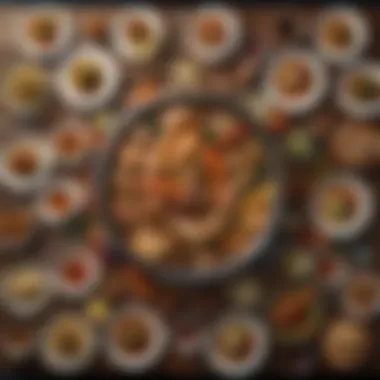Culinary Narratives: Insights from 'In Defense of Food'


Intro
In a world brimming with dietary fads, processing technologies, and relentless marketing ploys, the documentary In Defense of Food makes a strong case for returning to simpler, traditional eating habits. By taking a magnifying glass to our food system, it unwraps the layers of complexity surrounding what we consume. This exploration invites audiences to reassess not just their plates but also the deeply intertwined narratives of culture, health, and environmental sustainability. With this article, we aim to dissect these themes further, illuminating how our food choices shape individual well-being as well as communal health.
Key Concepts and Insights
Main Ideas from the Documentary
In Defense of Food pivots around several core ideas, each challenging the status quo regarding how we think about food:
- Whole versus Processed Foods: The documentary emphasizes the stark differences between naturally occurring foods and those altered through industrial processes. Whole foods, such as fruits, vegetables, and grains, are presented not just as ingredients but as building blocks of vibrant health.
- Mindful Eating: One of the prominent messages is the importance of being intentional with what we eat. This means not just paying attention to nutritional labels but embracing the sensory experience of food—its taste, texture, and origin.
- Cultural Significance: Eating is embedded in cultural practices. By understanding the social and cultural narratives that surround food, viewers can grasp how the act of eating becomes a communal experience rather than just a task to be checked off.
- Sustainability: The documentary warns against the environmental heft that comes with modern food production. It argues for a shift toward local, sustainable food systems that respect the earth and its resources.
"Eat food, not much, mostly plants." — This mantra summarizes the film's primary approach to how we should be thinking about our diets.
Practical Applications of Concepts
Understanding the insights from this documentary doesn’t have to live in the realm of theoretical discussion. Here are some applications that can be easily implemented in daily routines:
- Start Cooking at Home: Embrace simple recipes using whole foods. Learning to prepare meals can reclaim your relationship with food and cut down on reliance to pre-packaged meals.
- Join a Local CSA: Support local farmers through Community Supported Agriculture. This not only allows you to consume seasonal produce but also promotes community ties.
- Engage in Food Communities: Participate in local cooking classes, potlucks, or workshops that focus on traditional culinary practices. This can deepen your understanding of food’s cultural significance.
Recommendations and Further Reading
If the themes explored in In Defense of Food resonate with you and you wish to dive deeper, consider the following:
Related Books to Explore
- The Omnivore's Dilemma by Michael Pollan
- Food Politics: How the Food Industry Influences Nutrition and Health by Marion Nestle
- Salt, Sugar, Fat: How the Food Giants Hooked Us by Michael Moss
Additional Resources for Personal Development
Engaging with these resources will provide you with a more comprehensive understanding of food's role in both personal health and societal structures. From cultivating a garden to telling stories around the dinner table, the way we approach our meals can have profound implications. The journey into food narratives is one worth taking, for how we eat is fundamentally tied to how we live.
Preface to In Defense of Food
In the realm of dietary discussions, the documentary In Defense of Food stands as a pivotal narrative that sparks both contemplation and debate. This documentary does not simply highlight the overwhelming array of modern food choices; rather, it goes deeper, probing into the cultural narratives that shape our eating habits. The importance of understanding these relationships between food, culture, and health cannot be overstated. In an age where diets abound—from keto to vegan—the quest for nutritional clarity becomes more crucial than ever.
Overview of the Documentary
In Defense of Food is both a film and a call to action, inviting viewers to reconsider the way they approach food. The documentary begins with a straightforward yet profound motto: "Eat food. Not much. Mostly plants." Seems simple, right? But this statement is packed with significance. It encourages viewers to focus on whole, minimally processed foods, rather than getting lost in the complex maze of modern dietary fads and pseudo-scientific claims.
In presenting this mantra, the film delves into the consequences of our choices, specifically critiquing processed foods and their pervasive presence in today's diets. It poses vital questions, such as: What do we lose when we opt for convenience over quality? And how do our food choices impact our overall health and community?
The documentary showcases individuals from various walks of life, sharing their experiences with food. By weaving their stories into the fabric of the film, it illustrates how deeply personal and cultural connections to food can shape our daily lives.
The Filmmaker's Vision
The vision of the filmmaker, Michael Pollan, is a reflection of his philosophical approach to food and nutrition. He does not merely seek to inform; he aims to provoke thought and inspire change. His passion for sustainable eating practices is palpable throughout the film.
With his expertise in both journalism and academia, Pollan critically examines how the food industry has altered our perceptions and consumption patterns over the years. The filmmaker emphasizes that getting back to our roots—understanding where our food comes from and appreciating its journey—can significantly influence our health. He encourages viewers to break free from the shackles of convenience and instead, embrace the rich, vibrant culture of food preparation and consumption.
In summary, watching In Defense of Food is more than just observing a documentary; it’s a transformative experience. It serves as a crucial commentary on the current state of eating in modern society. By engaging with the film, audiences are urged to reflect on their own dietary practices within the broader context of culture, health, and community.


"Eat food. Not much. Mostly plants."
— Michael Pollan
As we continue to explore the angles of this documentary, we move beyond traditional understandings and towards a richer, more nuanced perspective on food. Every meal tells a story, and it's up to us to be mindful of the narratives we create with our food choices.
Historical Context of Eating Habits
Understanding the historical narrative of eating habits is crucial when exploring the overarching themes in the documentary. This context not only highlights how our diets have evolved but also underscores the significance of our current food choices within a broader societal framework. By examining how eating practices have changed over time, we can better comprehend the implications these shifts have for our health and cultural identity today.
Evolution of Dietary Practices
Dietary practices have undergone significant transformation throughout human history, often dictated by factors such as availability of food, cultural beliefs, and technological advancements. Early human diets were largely influenced by the environment, consisting mainly of foraged plants and hunted animals. This hunter-gatherer lifestyle provided rich nutrients but was variable and unpredictable.
As agriculture began to take hold around 10,000 years ago, our relationship with food began to change markedly. People transitioned into farming, resulting in the cultivation of staple crops like wheat, rice, and maize. Such a shift towards sedentary living led to an abundance of calories but also changed the nutrient profiles of diets. In agricultural societies, reliance on a limited number of crops created vulnerabilities in nutrition, something we are still grappling with today.
In more recent times, the first half of the 20th century brought about rapid changes due to urbanization and industrialization. The advent of factory-produced foods introduced convenience but also raised questions about nutritional loss and the rise of processed foods. What was once fresh and local became packaged and often void of essential nutrients. The documentary points out that this has significant health repercussions, contributing to the epidemic of obesity and chronic diseases prevalent today.
Impact of Industrialization on Food Choices
Industrialization has fundamentally reshaped food production and consumption patterns. No longer dependent merely on local harvests, food systems expanded significantly with the introduction of mass production. This shift allowed for a greater variety of food available to the masses; however, it frequently prioritized profit margins over nutritional value.
Fast food restaurants emerged, exemplifying this dramatic shift towards convenience over quality. This accessibility comes at a cost, often reflected by an increased consumption of highly processed foods laden with sugars and unhealthy fats. The documentary addresses this stark contrast between traditional diets, which were naturally balanced and nutritious, and modern offerings designed less for health considerations and more for palatability and profitability.
In addition to nutrition, the effects of industrialization on food cultures cannot be overlooked. Traditional practices and regional variations in diet have suffered, as globalization chases uniformity in food choices. People are offered worldwide cuisine options but may be losing touch with local traditions. As emphasized in the film, there is a palpable danger here; the stories behind food—what it signifies within communities—are at risk of being forgotten.
"The patterns of eating are not just reflections of personal choice; they are part of the story we tell about who we are as societies."
The intersection of food and industrialization is laden with complex implications, including economic disparities, cultural dilution, and worsening health outcomes. Recognizing these dynamics is vital in attempting to rekindle a more meaningful relationship with food, one that honors tradition, health, and local practices. With every bite we take, we should be aware of not only what we eat but the historical significance of those choices.
The Science of Nutrition in the Documentary
The documentary ‘In Defense of Food’ delves into the realm of nutrition, confronting a myriad of misconceptions surrounding modern dietary practices. In this section, we unpack the scientific principles that serve as the backbone for the film’s argument. The exploration of nutrition is not merely an academic exercise; it serves as an essential guide for individuals who wish to navigate their dietary choices with confidence and understanding. Fundamentally, it stresses the importance of recognizing food as more than just a source of calories. It is a vehicle for health, culture, and community.
Key Nutritional Principles Addressed
The documentary highlights several core nutritional principles that challenge the one-size-fits-all approach often seen in dietary recommendations.
- Whole Foods Over Processed: A prominent theme is the prioritization of whole foods—those that are minimally processed and closer to their natural state. This suggests that when individuals focus on foods like fruits, vegetables, whole grains, and lean proteins, they benefit from a richer nutrient profile.
- Diversity in Diet: Consuming a variety of foods is painted as not just beneficial but necessary. The documentary suggests that dietary diversity leads to better gut health and helps ensure that individuals are obtaining a well-rounded nutrition profile, which is often disregarded in restrictive diets.
- The Importance of Context: Nutritional needs can differ based on numerous factors such as age, gender, lifestyle, and cultural background. The documentary argues for a personalized approach to eating rather than adhering strictly to generalized dietary guidelines.
- Mindful Consumption: It dives into the idea of mindfulness when it comes to eating, emphasizing the importance of being aware of what one consumes, as well as enjoying the process of eating.
Through these principles, the film urges viewers to rethink the impact of their food choices, advocating for an intuitive approach to eating that honors traditional practices, rather than mere dietary restrictions based on current fads.
Critique of Contemporary Dietary Guidelines
As we look closely at contemporary dietary guidelines, the documentary poses a significant critique, particularly of their lack of flexibility and applicability to individual needs. The guidelines often focus heavily on macronutrient distribution without sufficiently considering the overall quality of the food consumed.
- Nutritional Reductionism: The tendency to reduce nutrition to mere numbers—calories, fats, sugars—overlooks the complex nutritional benefits inherent in whole foods. The documentary pushes back against this by suggesting that nutrient-rich foods should take precedence over caloric intake.
- Outdated Recommendations: Some guidelines are based on outdated science, often rooted in a time when the understanding of nutrition and its relationship to health was nascent. This calls for a reevaluation and consideration of emerging research.
- One-size-fits-all Approach: The strict frameworks presented in dietary guidelines do not cater to the diverse cultural practices and personal preferences that influence eating habits. This rigidity can lead people to disengage from what should be a joyful experience around meals.
"Eating is a connection to our history, our culture, and our community. The importance of food goes beyond mere nutrition—it's a way to build and strengthen relationships."
By critiquing conventional dietary standards, ‘In Defense of Food’ seeks to ignite a discussion around the need for more integrative, personalized dietary approaches. This not only respects individual differences but also encourages a return to savoring meals, fostering a deeper connection with food.
Tying these thoughts together, the documentary effectively champions a shift in public perception regarding nutritional science—one that favors whole foods, cultural relevance, and mindful practices, paving the way for healthier, more engaging food experiences.
Cultural Implications of Food Choices


The role of food in any society goes much deeper than merely satisfying hunger. It acts as a mirror reflecting the intricacies of culture, social structures, and values. When we delve into the documentary, In Defense of Food, we can see how these cultural implications mold dietary choices and influence our perception of food. The cultural implications of food choices are significant in understanding how we interact with food on a communal level and how it defines our identity.
Understanding food as a cultural identifier can enhance our appreciation for various cuisines and eating practices. In many cases, food serves as a canvas upon which each culture paints its history, geographical influences, and traditions. This enrichment carries several benefits:
- Identity Formation: Through culinary practices, individuals express their heritage. For instance, a family recipe handed down through generations often evokes memories and emotions linked to one’s cultural roots.
- Communal Bonds: Sharing meals is a way to deepen relationships. Whether it’s a family gathering around the dining table or friends gathering at a potluck, food unites us.
- Cultural Exchange: The globalization of food offers opportunities for cultural dialogues. Exploring cuisines from different cultures can reshape our understanding and appreciation of diversity.
"Food is a part of the world and our place in it, both as individuals and as part of a larger community."
Food as a Cultural Identifier
Food provides a vocabulary through which cultural identity is expressed. The ingredients, preparation methods, and dining customs often root deeply in history, telling stories of migration, colonization, and adaptation. In In Defense of Food, the film illustrates that traditional eating patterns often reflect a community's balance with nature. For example, Mediterranean diets emphasize local and seasonal produce, demonstrating an intrinsic connection to the environment and health benefits.
Moreover, the rise of fast food reflects not just a dietary choice but a cultural identity for many, particularly in urban settings. Despite its convenience, it often clashes with more traditional practices that value home-cooked meals. The embrace of fast food can signal a shift in values, portraying priorities shaped by modernity and global influences.
The Role of Tradition in Modern Diets
Tradition plays a crucial part in shaping our eating habits. The documentary highlights that modern diets increasingly favor processed convenience over wholesome, traditional foods. This shift is fueled by busy lifestyles and the omnipresence of fast food restaurants. Yet, within the foray of modern eating habits, many are looking back, returning to traditional methods and ingredients to regain control over their health.
In this light, there are essential considerations :
- Preserving Cultural Heritage: Maintaining traditional eating habits helps in preserving cultural narratives. Families pass down knowledge around food preparation, cooking techniques, and the significance of each dish.
- Nutritional Benefits: Traditional diets, often plant-based and focused on whole ingredients, are often linked to better health outcomes. By rediscovering such dietary practices, individuals can align their lifestyles more closely with health recommendations advocated in the documentary.
- Societal Resilience: Returning to traditional food systems can promote sustainability. Such practices not only support local economies but also encourage environmental awareness in how we source and consume food.
Criticism and Controversies
The exploration of criticism and controversies surrounding the documentary In Defense of Food serves a critical purpose in understanding its impact. It highlights the dialogue between popular nutritional narratives and the responses from experts in the field. This interplay is instrumental in understanding the broader implications for our dietary habits and the cultural discourse that surrounds food practices.
Responses from Nutritional Experts
Nutritional experts have weighed in uniquely on the claims made in the documentary. Some professionals praise its call for a return to whole foods, saying it provides a much-needed antidote to the overly processed diets that many have adopted. They argue that the emphasis on nutrient-rich foods rather than focusing solely on calories represents a progressive shift in nutritional understanding.
However, others critique the oversimplification of complex issues. They point out that while entire foods offer benefits, it's essential to recognize individual health needs and the diversity of dietary requirements. Furthermore, some experts caution against adopting an all-or-nothing approach, noting that a balanced understanding of moderation is often more practical in long-term health management.
"Food is not just about nutrition; it's a fundamental part of identity. We must consider individual needs and the cultural contexts of eating."
– Dr. Emily Winters, Nutritionist
Public Reception and Misinterpretations
The reception of In Defense of Food among the public illustrates how messages can be misconstrued. Many viewers come away with strong convictions, but these convictions vary markedly in depth and understanding. For some, the film serves as a wake-up call, prompting them to alter their eating habits dramatically.
Others, less informed on nutritional science, might misinterpret the film's messages, adopting rigid diets based on the documentary's themes without a comprehensive understanding of their own health needs. This risk of misinterpretation raises important questions about responsibility. Should filmmakers curate their messages with audiences' potential misunderstandings in mind? The implications of this documentary extend beyond personal choice; they resonate within societal structures that influence food availability and education.
In summary, the criticism and controversies surrounding In Defense of Food reflect the complex landscape of dietary practices today. Nutritional experts provide valuable insights that can shape how audiences perceive the film while public reception reveals the challenges of communicating nuanced dietary advice effectively.
Practical Implications of the Documentary's Message
The examination of the In Defense of Food documentary sheds light on a pressing subject in our contemporary culinary landscape. It challenges us to rethink our food choices, not merely as an individual concern but as part of a larger societal framework. The documentary emphasizes the interconnectedness of diet, culture, and well-being, which has profound implications for our daily lives.
The film’s message serves as a clarion call for developing a more mindful approach to what enters our plates. It encourages us to look beyond labels and nutritional stats, aiming for a deeper understanding of food sources, preparation, and consumption. By doing this, we can cultivate healthier habits that contribute to not only our personal health but also the sustainability of food systems. Let's break down several key practical elements derived from this narrative.
Implementing Dietary Changes
Making dietary changes can seem daunting, yet it starts with awareness. Here are some actionable strategies:
- Embrace Whole Foods: Focus on unprocessed or minimally processed foods, like fruits, vegetables, grains, and legumes. These are typically closer to their natural state and more nutrient-dense.
- Assess Your Habits: Take a few days to journal what you eat. This simple practice can unveil patterns of convenience or excessive reliance on processed foods.
- Cook at Home: Investing time in the kitchen can be transformative. Experiment with cooking new recipes that utilize fresh ingredients. Not only does it provide nourishing meals, but cooking is also a creative outlet.
While this journey is personal, it also involves understanding how different foods impact your health in the long run. Consider what you will be fueling your body with today and how it might affect you in years to come.
Mindful Eating Practices


Lifestyle choices, and particularly eating habits, can be heavily influenced by external pressures and time constraints. Mindful eating practices put the focus back on the experience of eating, inviting us all to slow down.
- Engagement with Food: Give full attention while eating. This means no screens, no distractions, just you and your meal. Feel the textures, savor the flavors, and appreciate the effort that went into your meal.
- Portion Control: Pay attention to hunger and fullness signals. Often, we consume food mindlessly. Practicing portion control helps re-establish a connection with our body's needs.
- Slow Down: Take your time with meals. Enjoying a meal over 20 minutes triggers the body's satiety signals, preventing overconsumption and leading to a more satisfying dining experience.
By incorporating these practices, not only do we foster a healthier relationship with food, we also build emotional awareness around what we consume, which can lead to a gratifying and fulfilling experience.
Building Community around Food
Food has always been central to human culture. Building a community around food can enrich our lives and reinforce cultural ties. Here are some effective ways to foster this community spirit:
- Farmers’ Markets and Local Grows: Engage with local producers. Shopping at farmers' markets not only supports local economies but also nurtures a relationship with the food you eat.
- Community Cooking Classes: Participate in experiences that encourage learning and sharing recipes. This collective exploration can rekindle appreciation for cooking traditional meals.
- Potluck Dinners: Invite friends and family to share their culinary creations. It brings together diverse flavors, traditions, and stories, fostering deeper connections and shared experiences.
Building these connections encourages shared learning about food, cooking, and health, ultimately empowering the community to make better dietary choices together.
"Food is the common ground, a universal experience, something that we all love, no matter what culture we’re from."
Reflections on the Future of Food
The topic of food is ever-evolving, with societal norms and scientific understanding continuously reshaping what we consume. In considering the future of food, we find ourselves at a crossroads where sustainability and technology intermingle to create a complex tapestry of culinary possibilities. With pressing global issues like climate change and the increasing demand for food due to a growing population, acknowledging what lies ahead is crucial for individuals and communities alike. This section will explore two significant facets: sustainable food practices and the role of technology in food production. Together, these elements not only address immediate concerns but also inspire a cultural shift toward more conscientious eating habits.
Sustainable Food Practices
Sustainability in food practices speaks to the balance between meeting present needs and ensuring the health of future generations. The idea is to cultivate a system where food production causes minimal harm to the environment while also being economically viable for producers – a delicate act that is easier said than done. Here are a few considerations:
- Local Food Systems: Sourcing food from local farmers not only supports the economy but reduces carbon footprints associated with transportation. It fosters a community-oriented approach to eating, encouraging relationships between consumers and producers.
- Organic Gardening: Growing food without synthetic fertilizers and pesticides nurtures both the soil and humans. Organic practices can lead to healthier ecosystems, reduce pollution, and create communities resilient to environmental changes.
- Seasonality: Emphasizing foods that are grown in their natural seasons can lead to a more varied and nutritionally rich diet. Seasonal consumption can reduce the need for greenhouse cultivation and lower the chances of spoilage and waste.
In essence, shifting towards sustainable food practices presents opportunities for innovation in culinary approaches, drawing from age-old traditions while incorporating modern techniques. As communities adopt these practices, we can foster resilience against the inevitable challenges posed by climate change and resource scarcity.
"Our food choices today impact the world of tomorrow."
Role of Technology in Food Production
While sustainability aims to respect natural systems, technology tools can optimize food production, benefitting both efficiency and output. Here are key areas where technology is making a significant impact:
- Hydroponics and Aeroponics: These innovative farming techniques enable growing crops without soil, using nutrient-rich water solutions or mist. This approach conserves water and allows food production in urban settings, making local food more accessible.
- Precision Agriculture: With the help of drones, GPS technology, and data analytics, farmers can monitor crops' health and resource needs. This allows for targeted interventions, minimizing waste and optimizing yields while ensuring the environment remains untouched.
- Blockchain in Supply Chains: Transparency in food sourcing can be improved through blockchain technology. It lets consumers trace food back to its source, offering assurance about the quality, safety, and ethical factors that are increasingly demanded by consumers today.
The integration of these technologies provides an avenue to address the challenges posed by a rapidly growing global population. However, as we harness these tools, we must also consider the ethical implications of technology in the food system, ensuring that access is equitable and that the focus remains on benefiting the environment and society as a whole.
Closure
In wrapping up this thorough examination of the documentary, it's clear that the conversation around food is far more complex than simple nutrient counts and calorie restrictions. What this article has shown is not just the importance of understanding what we eat, but the deep-rooted stories that our food tells about who we are and where we come from.
As we’ve examined, food transcends mere sustenance; it serves as a cultural bridge, a canvas for social interactions and, all too often, a battleground for dietary ideologies. The film decodes the psychological, cultural, and health implications of what has come to be known as modern eating habits. The takeaway here is that mindful consumption is not solely about choosing what is deemed "healthy"; rather, it's about reconnecting with our culinary heritage and being aware of the socio-economic rhythms that influence our choices.
Gathering insights from various segments of the documentary, we noted key themes:
- Nutrition Beyond Numbers: The emphasis is placed on whole foods rather than processed alternatives. Understanding these nuances helps us navigate food labels and marketing buzzwords more wisely.
- Cultural Significance: Food is a narrative of our history and identity. Our eating choices echo traditions passed down through generations, underscoring their importance in maintaining cultural ties.
- Individual Agency: The documentary encourages individuals to take ownership of their food choices, promoting an empowered approach to diet.
"The act of eating is a deeply personal experience that connects us to the past, roots us in the present, and shapes our future."
Through this exploration, we underscore the necessity for a shift in perspective. Eating is not merely a functional act; it embodies our social identities and challenges us to listen and learn from the ecosystem around us.
Summarizing Key Takeaways
- Reestablishing a connection with food can lead to improved mental and physical health. A shift toward whole, minimally-processed foods can transform eating habits dramatically.
- The documentary provides a platform for questioning modern dietary practices, pushing us to reassess our relationship with food.
- Nutrition should not be a sterile guide of calories and fats, but a narrative involving personal history, cultural significance, and ethical considerations.
Encouraging a Shift in Perspective
This article champions the importance of moving beyond a number-crunching approach to food. Rather than viewing dietary guidelines as absolute rules, consider them as flexible suggestions influenced by individual circumstances and broader contexts.
Reframing our food choices as expressions of our identity will open doors to more meaningful consumption. It’s about becoming mindful of every morsel that passes our lips—not restricted, but liberated through knowledge, culture, and community. Such a shift won't just change personal health trajectories; it has the potential to reshape societal dietary patterns. By amplifying the worth of culinary narratives, we can revolutionize how food fits into our everyday lives, leading to a healthier, more connected community.







